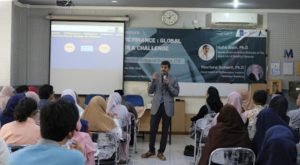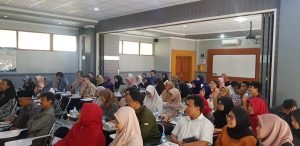ITS Finance Group guest lecture titled Islamic Finance: Global Trends and Challenges in the Mathematics Department
Information

The Chairperson of Activities, Wawan Hafid Syaifudin MSi MActSc said that the lecture initiated by ITS Finance Group became a place to introduce Islamic finance to students. ITS Finance Group itself is a group of lecturers from the Actuarial Department, Statistics Department, Mathematics Department, and Business Management Department who have research or interest in finance. “In the future, we also plan to unite all academicians to form a Center for Financial Studies and ITS Risk Management,” he said.In the lecture titled Global Trends and Challenge explained, Islamic finance is defined as a system that uses the basic principles of Islam as a guide. In practice, there is a prohibition on giving interest, gambling, monopoly, fraud, stockpiling, causing losses to one party. “The rapid development and the large number of Indonesia’s Muslim population encouraged us to be able to prepare for the arrival of the financial phenomenon,” explained the Actuarial lecturer.
Wawan added, the rapid financial trend can be seen from the number of countries in the world that have implemented the concept of Islamic finance. Among these countries, Qatar, Malaysia and Turkey. “Not a few countries that do not adhere to Islamic principles such as Singapore, Britain, Hong Kong and Nigeria have begun to adopt this system slowly,” he added.
One thing that according to him needs to be underlined, Islamic finance is not only related to Muslims. However, it can be used as an alternative concept that is more stable than the conventional financial system. “This system can attract borrowers who are still haunted by the turmoil of the global bond and equity markets in America which is exploding,” he said.

The enthusiasm of the participants when attending the Islamic Finance guest lecture by ITS Finance Group.
Unfortunately, in Indonesia itself, market penetration (growth strategy, ed) for finance and sharia insurance is still considered low. According to the University of Waterloo alumni, the biggest challenge of the topic of Islamic finance lies in its introduction in the academic environment and the wider community. Besides sounding still lay, this concept is quite often misinterpreted. “It does not have to be Muslim, everyone can learn and participate in the implementation process, hopefully more and more people are educated with this financial concept,” he hoped.
Latest News
-
ETS Schedule For Even Semester 2020 Department of Actuary
ETS Schedule For Even Semester 2020 Department of Actuary Download Post Views: 1,623
-
ACTUARIAL SCIENCE SHORT COURSE XIV
READI held an Actuarial Science Short Course for lecturers of actuarial study programs on the topic of Financial Mathematics.
-
Actuarial Short Course XIII – Financial Engineering 2
On December 16-20 2019, READI Project held an Actuarial Short Course with Topic: Financial Engineering 2. This training was





